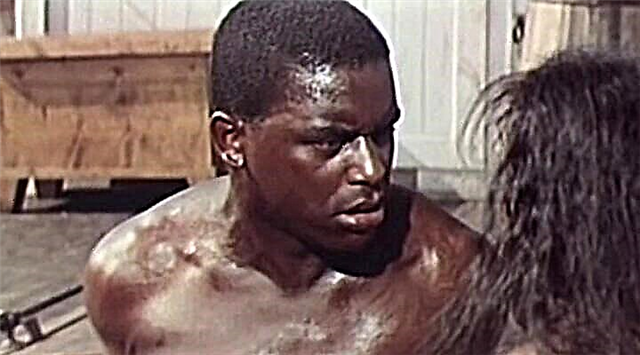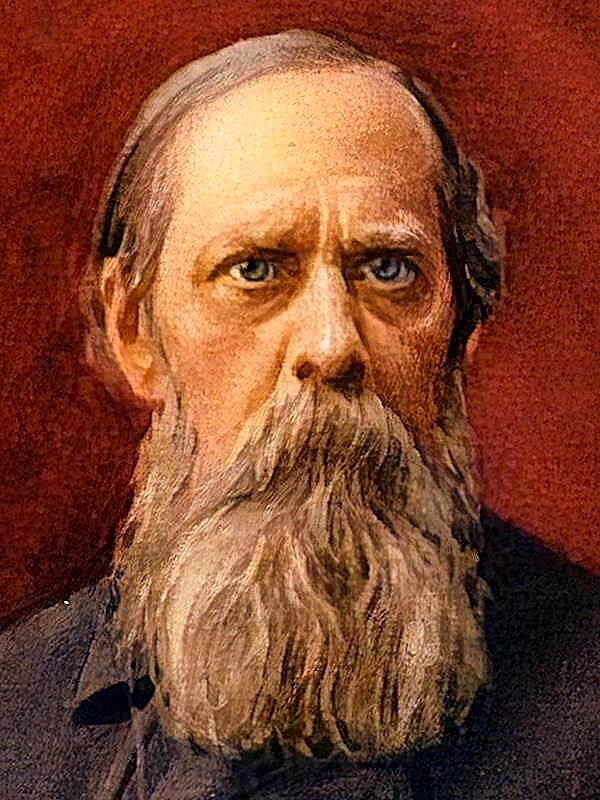On December twenty-fourth, 1949, at five o’clock in the evening, the second-ranking state adviser Innokenty Volodin almost ran away from the stairs of the Ministry of Foreign Affairs, ran out onto the street, took a taxi, rushed along the central Moscow streets, got off on Arbat, went into the telephone booth at the Khudozhestvenny movie theater "And dialed the number of the American embassy. A graduate of the Higher Diplomatic School, a capable young man, the son of a famous father who died in the Civil War (the father was one of those who dispersed the Constituent Assembly), son-in-law of the prosecutor for special affairs, Volodin belonged to the upper strata of Soviet society. However, natural decency, multiplied by knowledge and intellect, did not allow Innocent to fully put up with the order existing on one sixth of the land.
The trip to the village, to his uncle, who told Innokenty about the violence that the state of workers and peasants allowed themselves and that the cohabitation of Father Innocent and his mother was essentially violence, finally opened his eyes to him. , a young lady from a good family. In a conversation with Uncle Innocent also discussed the problem of the atomic bomb: how scary it would be if the USSR appeared.
After some time, Innocent found out that Soviet intelligence had stolen the blueprints of an atomic bomb from American scientists and that the other day these blueprints would be handed over to agent Georgy Koval. That is what Volodin was trying to report by telephone to the American embassy. How much they believed him and how much his call helped the cause of peace, Innocent, alas, did not recognize.
The call, of course, was recorded by the Soviet secret services and had the effect of precisely what exploded a bomb. Treason! It is terrible to report to Stalin (busy these days with important work on the basics of linguistics) about high treason, but it is even worse to report right now. It is dangerous to pronounce the word "telephone" under Stalin. The fact is that in January last year, Stalin ordered to develop a special telephone connection: especially high-quality, so that it can be heard as if people are talking in the same room, and especially reliable, so that it can not be eavesdropped. The work was entrusted to a scientific special object near Moscow, but the task turned out to be difficult, all the deadlines passed, and the matter was hardly moving.
And very inappropriately, this insidious call to a foreign embassy arose. Four suspects were arrested at the Sokolniki metro station, but it is clear to everyone that they have nothing to do with it. The circle of suspects in the Foreign Ministry is small - five to seven people, but everyone cannot be arrested. As deputy Abakumova Ryumin wisely said: “This ministry is not Pishcheprom.” It is necessary to identify the voice of the caller. There is an idea to entrust this task to the same special object near Moscow.
Marfino's object is the so-called sharashka. The kind of prison in which the color of science and engineering is collected from all the islands of the Gulag to solve important and secret technical and scientific problems. Sharashki comfortable for everyone. To the state. In the wild, you cannot bring together two great scientists in one group: the struggle for glory and the Stalin Prize begin. And here fame and money do not threaten anyone, one half a glass of sour cream and another half a glass of sour cream. Everyone is working. It is also beneficial for scientists: to avoid camps in the Land of Soviets is very difficult, and sharashka is the best of prisons, the first and softest circle of hell, almost paradise: warm, well fed, no need to work in terrible penal servitude. In addition, men reliably divorced from families, from the whole world, from any fate-building problems, can indulge in free or relatively free dialogues. The spirit of male friendship and philosophy soars under the sailing arch of the ceiling. Perhaps this is the bliss that all the philosophers of antiquity tried in vain to determine.
German philologist Lev Rubin was at the front major of the "department for the decomposition of enemy forces." From prisoner of war camps, he chose those who agreed to return home to cooperate with the Russians. Rubin not only fought with Germany, not only knew Germany, but also loved Germany. After the January offensive of 1945, he allowed himself to doubt the slogan “blood for blood and death for death” and ended up in jail. Fate led him into a sharashka. Personal tragedy did not break Rubin's belief in the future triumph of the communist idea and in the genius of the Leninist project. A beautifully and deeply educated man, Rubin continued to believe that the red business was winning, and innocent people in prison were just the inevitable side effect of the great historical movement. It was on this topic that Rubin led serious disputes with his fellows. And remained true to himself. In particular, he continued to prepare for the Central Committee a “Project on the Creation of Civil Churches,” a distant analogue of churches. Here, ministers in white clothes were supposed to be here, here the citizens of the country had to take an oath of allegiance to the party, the Fatherland, and their parents. Rubin wrote in detail: based on which territorial unit the temples are being built, which dates are marked there, the duration of individual rites. He did not pursue fame. Realizing that the Central Committee might not be able to accept the idea from a political prisoner, he assumed that one of the free front-line friends would sign the project. The main thing is the idea.
In sharashka, Rubin is engaged in “sound,” the problem of searching for the individual characteristics of speech, captured in a graphic way. It is Rubin who is offered to compare the voices of the suspects of treason with the voice of the person who made the treacherous call. Rubin takes on the task with great enthusiasm. Firstly, he is filled with hatred for a man who wanted to prevent the Homeland from possessing the most advanced weapons. Secondly, these studies can be the beginning of a new science with great prospects: any criminal conversation is recorded, compared, and the attacker is not hesitantly caught, like a thief who left fingerprints on the safe door. For Rubin to cooperate with the authorities in such a matter is a duty and the highest morality.
The problem of such cooperation is also decided by many other prisoners of sharashka. Illarion Pavlovich Gerasimovich sat "for sabotage" in the 30th, when all the engineers were imprisoned. In the 35th year he went out, his bride Natasha came to him on Amur and became his wife. For a long time they did not dare to return to Leningrad, but they decided - in June the forty-first. Hilarion became a grave digger and survived due to other people's deaths. Even before the end of the blockade, he was imprisoned for his intention to change his homeland. Now, on one of the dates, Natasha prayed that Gerasimovich would find an opportunity to set off, to fulfill some super important task, so that they would shorten the term. To wait another three years, and she is already thirty-seven, she was dismissed from work as the wife of the enemy, and she already has no strength ... After some time, Gerasimovich has a happy opportunity: to make a night camera for door jambs to take off any incoming and outgoing photos. Will do: early release. Natasha was waiting for his second term. A helpless lump, she was on the verge of extinction, and with her the life of Hilarion would die out. But he answered nevertheless: “Putting people in jail is not in my specialty! It’s enough that they put us ... "
Counts on early release and Rubin's enemy friend on disputes Sologdin. In secret from his colleagues, he is developing a special encoder model, the draft of which is almost ready to be put on the table by his superiors. He passes the first examination and receives the “go-ahead”. The path to freedom is open. But Sologdin, like Gerasimovich, is not sure that he needs to cooperate with the communist intelligence agencies. After another conversation with Rubin, which ended in a major quarrel between friends, he realizes that even the best of the Communists cannot be trusted. Sologdin burns his drawing. Lieutenant Colonel Yakonov, who had already reported on the successes of Sologdin upstairs, was in indescribable horror. Although Sologdin explains that he realized the fallacy of his ideas, the lieutenant colonel does not believe him. Sologdin, who has already sat twice, realizes that a third term awaits him. “It’s half an hour from here to the center of Moscow,” says Yakonov. - You could board this bus in June - in July this year. And you didn’t want to. I admit that in August you would have already received your first vacation - and would have gone to the Black Sea. Bathe! How many years have you entered the water, Sologdin? ”
Whether these conversations have worked or something else, but Sologdin gives in and commits himself to do everything in a month. Gleb Nerzhin, another friend and interlocutor of Rubin and Sologdin, becomes a victim of the intrigues that lead inside the sharashka two competing laboratories. He refuses to move from one laboratory to another. The work of many years perishes: secretly recorded historical and philosophical work. You cannot take him to the stage where Nerzhin will now be sent. Love is dying: recently, Nerzhin has had tender feelings for a free laboratory assistant (and part-time lieutenant MTB) Simochka, who reciprocates. Simochka has never had a relationship with a man in her life. She wants to get pregnant from Nerzhin, give birth to a baby and wait for Gleb for the remaining five years. But on the day when this should happen, Nerzhin unexpectedly gets a date with his wife, whom he had not seen for a long time. And decides to abandon Simochka.
Rubin's efforts are bearing fruit: the circle of suspected treason has narrowed to two people. Volodin and a man named Shchevronok. A little more, and the villain will be decrypted (Rubin is almost sure that this is Chevronok). But two people - not five or seven. A decision was made to arrest both (it cannot be that the second was completely innocent of anything). At this moment, realizing that his efforts to go to the hell of the Gulag were going innocent, Rubin felt terribly tired. He remembered his illnesses, his term, and the hard fate of the revolution. And only by himself pinned to the wall a map of China with a shaded red communist territory warmed him. Despite everything, we win.
Innocent Volodin was arrested a few days before flying on a business trip abroad - to that same America. With terrible bewilderment and great torment (but also with some even amazed curiosity), he enters the territory of the Gulag.
Gleb Nerzhin and Gerasimovich go to the stage. Sologdin, who has put together a group for his developments, offers Nerzhin to get a shot for him if he agrees to work in this group. Nerzhin refuses. Finally, he makes an attempt to reconcile former friends, and now ardent enemies of Rubin and Sologdin. Unsuccessful attempt.
Prisoners sent to the stage are loaded into a car with the inscription “Meat”. The correspondent of the newspaper "Libration", seeing the van, makes a note in a notebook: "On the streets of Moscow, there are vans with products that are very tidy, sanitary and impeccable."












